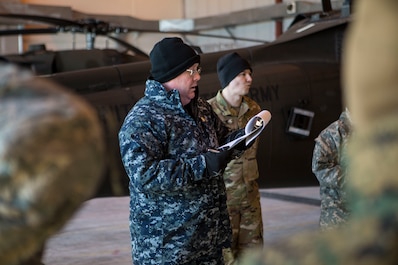By Marine Corps Sgt. Melissa Martens Marine Forces Reserve
KOTZEBUE, Alaska, April 16, 2018 — Deep within Alaska’s
Northwest Arctic Borough, where snow and ice blanket the surface and winds send
piercing chills through the body, service members have gathered here for the
start of Arctic Care 2018, a Defense Department-sponsored innovative readiness
training event.
The innovative readiness training program aims to produce
mission-ready forces through military training opportunities that provide key
services for underserved communities throughout the United States.
“Innovative readiness training is a very unique training
program where our primary mission is to train service members through
real-world situations,” said Marine Corps Maj. Lisbeth M. Andriessen, the IRT
program manager for Marine Forces Reserve.
Military Training, Assisting Civilian Communities
“A lot of the missions we conduct take place in austere
conditions in extremely remote communities of the United States,” Andriessen
added. “It’s a great program, because the service members get the training and
the community gets the byproduct of having these services brought to them.”
Service members from the Marine Corps Reserve, Navy Reserve,
Air National Guard, Air Force Reserve, Army Reserve, Alaska Army National
Guard, Coast Guard and Canadian armed forces are deployed to provide medical,
dental, optometry and veterinary care to 12 remote villages throughout the
Northwest Arctic Borough, April 13-27.
Marine Forces Reserve is the lead service for this year’s
Arctic Care. Personnel from 4th Dental Battalion and 4th Medical Battalion, 4th
Marine Logistics Group, are coordinating and conducting critical mission
training and logistical movements with the other military branches to simulate
military-civilian humanitarian operations and health care delivery in time of
crisis, conflict or disaster.
“The lead service is chosen based off the needs of the
mission and the personnel requested,” said Air Force Capt. Laura B. Delgado
with 176th Medical Group, Alaska Air National Guard. Delgado is the assistant
officer in charge of IRT Arctic Care 2018.
Joint Training Partnership
The communities to be visited during the training don’t have
access to health care services that more heavily populated areas have, Delgado
explained. “With Marine Forces Reserve taking the lead,” she added, “the
different military branches will be learning from each other and working
together to enhance their skills while providing specialty services to the
local villages.”
One of the key goals of the IRT program is to strengthen and
build new partnerships with culturally complex populations, including remote
areas. By conducting hands-on training to service members, IRT Arctic Care aims
to meet this goal by providing direct and lasting benefits to residents of each
village served.
“A lot of service members will come out of an IRT and say,
‘I joined the service to help my community, and this is one place where I had
the opportunity to do that,’” Andriessen said. “When they have community
members coming up to them, shaking their hands and thanking them for their hard
work, it really strengthens the bond between the civilians and the military.”









No comments:
Post a Comment